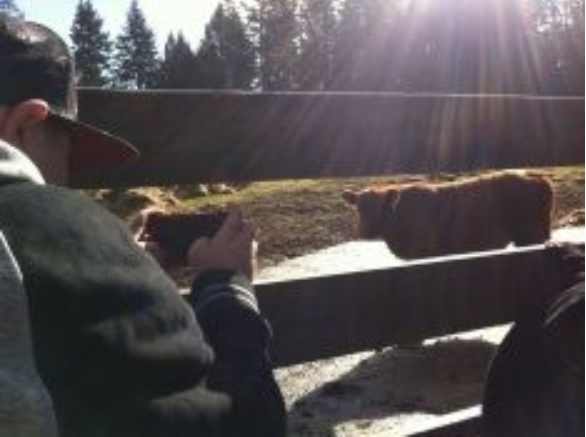Edward Milne Community School, Sooke, BC
Grades 9-12
660 Students, including 70 International Students and 118 of Indigenous Ancestry
2017-2018 (Year 2)
At Edward Milne Community School, our students are serving up fresh, local veggies from our salad bar four days a week, 30 week of the year – that’s 2,000 salads served!
When I think about the collective efforts in growing our Farm to School program, I’m always excited and hopeful. Student experiences are hard to sum up in stats and notes. One particular student enjoyed her involvement so much this season, she regularly expressed her enthusiasm and hopes that even more students will get involved in the future. She spearheaded communally prepared meals to share with fellow students, in efforts to build food security, food literacy, and a greater sense of community among students from Sooke and our International students. She will be continuing her community building and health promoting journey by volunteering in a clinic in Africa this Fall.
Other students enjoyed learning in the garden, whether harvesting and trying new kinds of vegetables (purple snap peas and white strawberries were both popular this year), or working with five year old’s to explore insects in the garden, or planting garlic and potatoes – many of the students reported gardening as one of their preferred class activities.
While there will always be weeds and pests, poor weather and crop failures, our shared journey of growing, harvesting, preparing, and eating food together provides unique spaces for collaborative learning.
Below are just a few of the highlights from our Farm to School program:
- Salad Bar served four days per week, 30 weeks per year!
- Over 2,000 Salads served!
- School garden grown produce harvested year round
- Over 100 crop varieties grown, as well as various tree fruits and berries
- A focus on heirloom varieties, including “Three Sisters” plots with Indigenous corn, beans, and squash
- Produce used in Culinary Arts and Food Studies programs, preparing 1000’s of healthy meals
- Community connections: LifeCycles, the Good Food Network, the Food Rescue Project, Sooke Food CHI, SunRiver Community Garden, Slow Food Canada, and others
- Over 1,000 student service learning hours involved in local food systems projects
- Nature Kindergarten garden mentorship program pilot
- Incorporation of Indigenous traditional foods and knowledge
- Collaboration with school departments: Trades, Math, Science, Languages, Environmental Studies, Home Economics, Culinary Arts, Aboriginal Education, and Life Skills
- Over 250 students directly involved in planning, planting, tending, and harvesting school garden grown produce
- Rescued food and school grown produce used by students to prepare healthy meals, which are shared with any interested students to promote community, food literacy, and food security
- Connecting with other educators by hosting PD workshops: School Garden Use and Development, Salt Spring Island Food System Discovery, Fermentation Workshops
- Field trips to local community gardens, permaculture and organic farms, heritage livestock, sustainable homes, and others
- New Course Development- Sustainable Lifestyles and Local Healthy Food Systems (grades 10/11/12) course to be offered 2018/19 school year
- Program supported by Whole Foods, Whole Kids Foundation, Farm to Cafeteria Canada, CRFAIR, the Food Rescue Project, Sooke Soil, Agriculture in the Classroom BC, and others
- Related programs include; milling our own locally grown organic heritage grains, pressing school and locally grown apples, tapping Big Leaf Maples, harvesting traditional ethnobotanical plants for tea making, harvesting and drying seaweeds
- And more!
2016-2017 (Year 1)
Edward Milne Infusing Home Economics with Local Food
 Patrick Gale is the Foods and Nutrition (grades 9 to 12) program teacher at Edward Milne Community School in Sooke, BC. He takes a local food system perspective in his work. Sourcing local food is an important piece of the program. Students plan, prepare, tend and harvest produce from their school garden, greenhouse, mini orchard and land they reside on. Patrick’s students help bring local food to the entire student body. The food they harvest is used for both their Foods and Nutrition program and the Culinary Arts program, supporting a bountiful salad bar.
Patrick Gale is the Foods and Nutrition (grades 9 to 12) program teacher at Edward Milne Community School in Sooke, BC. He takes a local food system perspective in his work. Sourcing local food is an important piece of the program. Students plan, prepare, tend and harvest produce from their school garden, greenhouse, mini orchard and land they reside on. Patrick’s students help bring local food to the entire student body. The food they harvest is used for both their Foods and Nutrition program and the Culinary Arts program, supporting a bountiful salad bar.
Students explore where their food comes from by participating in seasonal field trips, which include visiting farms, gardens, heritage livestock, orchards, forests, bakeries, and so much more. Through field trips and connecting with local producers and knowledge keepers, students learn about where their food comes and experience how to preserve it including pressing apples, tapping maples, milling local flours, and dehydrating fruits and herbs. All of these experiences fold back into the program, allowing students to eat local food in all seasons.
Indigenous food systems and indigenous community engagement are an important part to understanding that food comes from the land, water and sky; this is a learning from elders and knowledge in our region. Harvest and ethnobotany teachings and practices are essential to raise the next generation to become stewards of the environment that feeds them. Students who take Patrick’s class are not only building knowledge to become future food system leaders, they are getting the experience to try new foods, and appreciate the importance of local food.
In 2016/17, the EMCS garden has been an active and engaging learning environment throughout the school year. In the Fall, students harvested, prepared, and consumed squash, potatoes, herbs, apples, pears, quince, kale and other greens, tomatoes, carrots, sunchokes, heritage corn, and other crops. Over the Winter, students prepared the gardens for the coming growing season by adding compost and new soil, while commencing repairs and working with the Trades program to replace broken plots. In the Spring, new berry and fruit trees and bushes were planted and seeds were started in the greenhouse for later planting. After Spring Break, students planted outdoor beds with greens, radishes, peas, potatoes, and other early crops and continued to care for the gardens. By May, the 2017 harvest had begun, with rhubarb, greens, herbs, radishes, and other fresh produce contributing to healthy meals and the salad bar.
Students are starting to grow new attitudes and habits towards healthy eating and are excited for the future bounty of this program.



